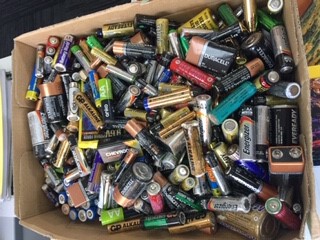Here at Merici our used batteries are collected and taken to Aldi for recycling. The displayed photo of the batteries that we have collected which will be recycled. So why do we do this? Read on…
FIVE BENEFITS OF RECYCLING BATTERIES
Source: https://ecocycle.com.au/batteries/5-benefits-of-recycling-batteries/
Every time you have the choice of recycling your old batteries or disposing of them in the rubbish bin, here are some of the key reasons why recycling should be the only option:
1. Recover non-renewable resources
Our growing use of batteries mean that more raw materials are being mined, processed, turned into batteries and then into waste.
These materials include the metals lead, cadmium, nickel, steel, zinc, mercury, cobalt, lithium, silver and manganese plus, in some battery types, rare earth elements.
These metals are not renewable, but they are infinitely recyclable.
Dumping them in landfill means they are no longer available for use, whereas recycling them allows these materials to continue to deliver economic benefits to us.
2. Keep harmful materials out of the environment
Many of the metals listed in the previous point are, unfortunately, harmful to the environment and to human health.
Perhaps most famously, mercury is a cause of both historic and ongoing mercury poisoning. Lead and cadmium are also amongst the more dangerous of environmental pollutants.
When disposed of in landfill, batteries break down. The toxic materials can then leach out of the landfill and into waterways and the ocean. In fact, the mercury in the batteries you discard can end up back on your dinner plate!
Recycling is the economically and environmentally sensible way to solve this problem.
3. Ensure spent batteries are kept safe
Relative to the vast numbers of batteries in use, battery explosions and fires are relatively rare. However, they can occur and fires in waste facilities can be very hard to extinguish.
Some types of lithium battery are more likely to cause fires than others, but all batteries need to be treated with respect if they are damaged or exposed to heat. Proper storage and handling can minimise the fire and explosion risk.
The other major safety issue with batteries relates to small button cells. These can easily be swallowed by small children and cause severe injuries or even death. They should be stored safely and deposited at a battery recycling collection point as quickly as possible.
4. Meet increased demand for recycling
77% of consumers agree that it is important to recycle batteries rather than simply dump them (IPSOS 2014).
This is great news for future recycling efforts, as it shows the willingness of the community to get behind battery recycling initiatives.
5. It’s incredibly easy to recycle batteries
Ensuring that we reap the benefits of battery recycling is easy. A growing number of retailers, including ALDI and IKEA, now accept batteries for recycling. Many council facilities also operate as battery collection points. You can find your nearest collection point at recyclingnearyou.com.au
Battery recycling, what’s to think about?! Let’s keep our batteries out of the landfill.
Felicity Maher
Sustainability Officer




